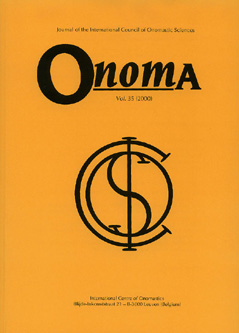 previous article in this issue previous article in this issue | next article in this issue  |

Preview first page |
Document Details : Title: Namenrechtliche Anfänge in Österreich Subtitle: Frühe Regelungen zu Namenwahl, Namenführung, Namenwechsel und Namenschreibung von Ruf- un Familiennamen Author(s): LINSBERGER, Axel Journal: Onoma Volume: 47 Date: 2012 Pages: 203-222 DOI: 10.2143/ONO.47.0.3085146 Abstract : Die Anfänge des Personennamenrechts in Österreich fallen in die Regierungszeit Maria Theresias und Josephs II und sind in einer Reihe von Verordnungen und Erlässen dokumentiert. Mit dem Einsetzen amtlicher Regelungen zu Namenwahl, Namengebung, Namenführung, Namenschreibung und Namenwechsel von Ruf- und Familiennamen unterschiedlicher Bevölkerungsgruppen bilden diese Verordnungen eine wichtige Grundlage unseres heutigen Namenverständnisses und haben namenpragmatische Auswirkungen, die für den rezenten Namenbestand und die aktuelle Namenlandschaft bis heute prägend sind. Die namenrechtlichen Anfänge in Österreich waren bislang kaum Gegenstand eigenständiger onomastischer Untersuchungen und wurden, wenn überhaupt, bei der Behandlung der deutschen Gegebenheiten am Rande miterwähnt. Der geplante Beitrag will die wichtigsten Verordnungen aus österreichischer Sicht zusammenstellen, aus onomastischer Perspektive kommentieren und zur weiteren wissenschaftlichen Verwendung möglichst originalgetreu wiedergeben. Neben den teilweise bereits bekannten (aber oft unzureichend zitierten) allgemeingültigen Rechtsquellen wird dabei speziell auch auf bislang wenig beachtete Rechtsquellen und die teilweise erst später einsetzenden spezielle Regelungen für Juden, Frauen und uneheliche Kinder eingegangen. The origin of laws concerning personal naming dates from the reign of Maria Theresia and Josef II. They are documented in a series of directives and decrees. These directives, the beginning of official regulations about the selection, bearing, change and orthography of the given and family names of various ethnicities, are an important foundation for our present-day understanding of names, and they have pragmatic consequences which have formed and continue to form our recent name-stock and our current onomastic landscape. Till now the beginning of name law in Austria has rarely been the subject of original study, and if it has been mentioned at all, it has been on the periphery of discussions of circumstances in Germany. This article assembles those directives which are the most important from an Austrian viewpoint, offers comments from the perspective of onomastics, and reproduces them for further scientific analysis in a form as faithful to the originals as possible. Alongside general legal sources which are in part already known but often unsatisfactorily cited, there is special emphasis on sources which have hitherto received little attention, and also on the special, in part chronologically later, regulations concerning Jews, women and bastard children. La question du droit des noms de personne en Autriche se fait jour sous les règnes de Marie-Thérèse et Joseph II, par le biais d’ordonnances et de décrets. Avec l’apparition de règles officielles concernant le choix, l’attribution, la gestion, la graphie et le changement des prénoms et noms de famille de différents groupes de population, ces textes constituent un fondement important pour la compréhension actuelle des noms et ont des conséquences sur la pragmatique des noms, qui jusqu’aujourd’hui marquent le statut récent et le paysage actuel du nom. Les origines du droit du nom en Autriche n’ont jusqu’ici guère fait l’objet de recherches onomastiques indépendantes, et n’ont été évoquées, le cas échéant, que par le traitement à la marge des réalités allemandes. Cet essai propose une vue d’ensemble des ordonnances les plus importantes du point de vue autrichien, un commentaire sous l’aspect onomastique, et une représentation si possible fidèle à l’original pour d’autres usages scientifiques. Outre les sources juridiques déjà partiellement connues et généralement admises (mais souvent citées mal-à-propos), sont aussi mises en oeuvre des sources jusque-là négligées et des règles spécifiques plus tardives pour les Juifs, les femmes et les enfants naturels. |
|


